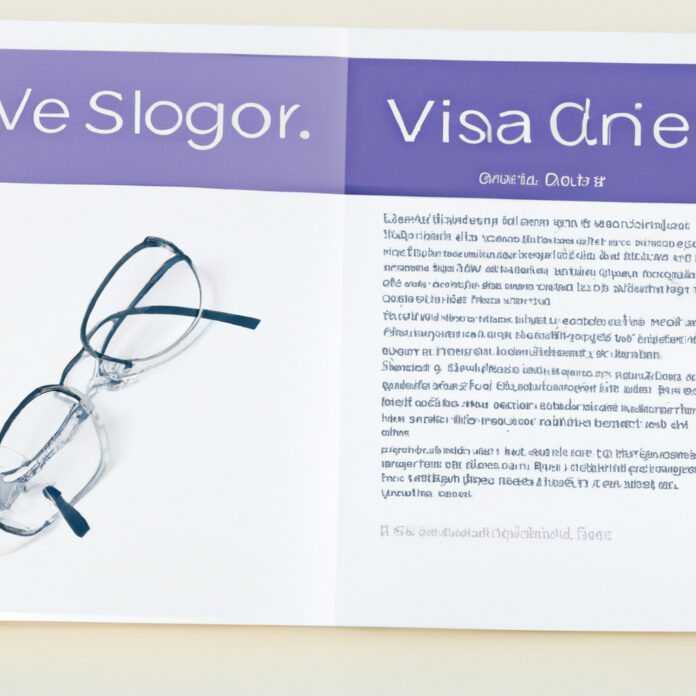As we progress through life, our vision often becomes less reliable as we age. The most common vision issues that are experienced in later years include cataracts, glaucoma, age-related macular degeneration, and diabetic retinopathy. In this article, we will discuss preventive measures and the available support options for managing vision and eye care in later years.
1. Aging Eyes: Maintaining a Healthy Vision in Later Years
As we get older, our vision is one of the first senses to be affected. Our eyes naturally undergo changes in shape and function as part of the natural aging process. While regular eye exams are important for everyone, they are especially important for older adults. Here are a few tips to help maintain healthy eyesight in later years:
- Perform Vision Tests: Annual vision tests are a crucial part of maintaining eye health as we age. Getting a checkup will help detect any abnormalities or changes in vision that can be addressed.
- Eat Right: Eating fresh fruits and vegetables, as well as foods rich in omega-3 fatty acids, can help improve vision. Vitamins A, C, and E, as well as zinc and other carotenoids, have been shown to be beneficial for vision health.
- Don’t Smoke: Smoking has been linked to macular degeneration and other eye diseases. Quitting smoking at any age will help improve overall health.
In addition to the above, it’s important to protect your eyes from the sun, get plenty of rest, and wear the proper eyewear when out in the sun or on the computer. Taking care of your eyes will help you maintain healthy vision as you age.
Regular checkups and lifestyle changes are key to keeping your vision healthy and strong as you age. Stay on top of your vision health and keep your eyes in tip-top shape!
2. Taking the Necessary Steps to Guard Vision in the Elderly
A lifetime of exposure to the sun and other age-related changes can take a toll on your vision. But there are some important steps that seniors can take to guard their vision.
- Eat a Balanced Diet: A healthy diet is one of the best ways to promote healthy vision and prevent age-related eye diseases. For optimal eye health, seniors should focus on including plenty of omega-3 fatty acids, zinc, vitamins C and E, lutein, and zeaxanthin in their diet.
- Wear Sunglasses: To protect the eyes from UV light, it is important to wear a quality pair of sunglasses that is designed to block both UVA and UVB rays. Look for sunglasses that offer 100 percent UV protection for the safest option.
- Don’t Smoke: Smoking can damage the eyes and increase the risk of developing age-related macular degeneration and cataracts.
- Schedule Regular Eye Exams: Visiting the eye doctor for regular exams can help detect serious eye problems, such as glaucoma or cataracts, before they become severe.
It is also important for seniors to try to limit their exposure to screens such as televisions, computers, and cell phones. This is because these devices emit blue light which can cause eye strain and fatigue. Additionally, seniors should maintain good hygiene practices such as washing their hands regularly and avoiding rubbing their eyes with dirty hands.
As seniors age, it is important to take the necessary steps to guard their vision. By following these simple tips, seniors can keep their vision healthy for years to come.
3. Caring for Your Vision: Lifestyle Changes for Better Eye Health
Proper care of your vision is essential to your overall health and well-being. Even if you don’t need glasses or contact lenses, you still need to practice good eye care habits for better eye health. Here are some lifestyle changes that can help you make sure your eyes stay healthy and functioning longer.
Diet: Eating a nutritious and well-balanced diet is important for eye health. You should strive to include foods rich in lutein, omega-3 fatty acids, anthocyanins, zinc, and Vitamins C and E. Examples include leafy green vegetables, fatty fish, citrus fruits, and whole grains. Minimizing processed foods and eating in moderation can also help keep your vision sharp.
Exercise: Regular physical activity helps promote overall health and general well-being. It is also beneficial to your vision health by increasing blood flow to the eyes and helping to reduce the risk for certain conditions. Aim to get at least 30 minutes of moderate exercise per day.
Protect:
- Wear protective eyewear when participating in sports or engaging in any activity that may cause trauma to the eyes.
- Protect your eyes from the sun by wearing protective lenses. Consider polarized sunglasses for optimal protection.
- In hazardous workplaces, use proper safety equipment, such as protective eyewear and face guards.
Relax: Staring at a computer screen or television for too long can cause eye strain, dryness, and irritation. It is important to give your eyes a break every 20 minutes or so. Blink more often, focus on distant objects, and massage your temples and eyelids to reduce strain.
4. What Resources are Available for Senior Eye Care?
Seniors have a need for comprehensive eye care, even if their vision seems unchanged. Fortunately, there are available resources for senior eye care that can aid in this. Here are some of the main ones:
- Eye Exams: Many senior insurance plans provide coverage for basic eye exams. It’s important to schedule a yearly exam to help detect changes in vision, as early intervention is key.
- Assistance Programs: Medicare and Medicaid offer benefits that may include coverage for eyeglasses and eye exams for pregnant women and those with limited incomes.
- Financial Help: Seniors who can’t afford eyeglasses or eye exams may be eligible for financial help from local and national organizations, such as Lions Club International.
By proactively investing in eye care, seniors may be able to maintain and improve their vision, as well as detect early signs of eye disease. Fortunately, advanced technology like optical coherence tomography (OCT) and auto-refraction can be used to pinpoint underlying eye issues for a holistic eye health solution. With these advanced diagnostics, ophthalmologists can determine the best course of treatment to reduce risks of eye problems in the long-term.
Technology advances may cost more, but seniors may find additional savings through bulk purchasing and discounts. Many optical chains offer special deals throughout the year, such as grandparent discounts, that could help cover the costs of eye exams and new eyewear.
5. Keeping a Future Perspective: Investing in Eye Care Today to Secure Sight into the Future
Good eye health is essential for preserving sight and protecting the vision of future generations. Investing in eye care today is the best way to ensure that this is possible.
1. Prevention is key: Promoting the importance of preventive eye care is perhaps the most important step in securing the future of our sight. Regular eye check-ups, screenings, and tests allow us to identify and treat potential vision problems as soon as possible. This means taking advantage of modern technology, protective glasses, and access to qualified professionals to promote a healthy vision for the here and now and into the future.
2. Education: Many vision problems can be avoided by raising awareness among the public. Knowing that the most effective way to combat vision problems is to begin with prevention and early detection is key for ensuring future sight. That’s why it’s important to educate young and old about the risks and importance of taking care of eyes.
3. Improving access to quality care: For those who do not have the resources or access to regular eye care, it can be especially difficult to receive the care needed to protect future sight. Improving access to quality eye care is essential, providing financial assistance and making sure people can receive the care they need.
- Providing access to low-cost or free vision services.
- Including eye care in public and private health insurance plans.
- Making innovative technology more accessible.
Taking these steps today, can help protect our eyesight now and into the future for generations to come.
As we age, many of our body’s processes naturally change and degrade. Our vision is one of those things that can become altered or destroyed if not taken care of properly. But don’t be discouraged; there are ways to ensure that our eyes stay healthy even in our later years and prevent vision problems. With a few simple preventive measures and the necessary support, we can keep our eyes healthy and our vision strong for many years to come.





